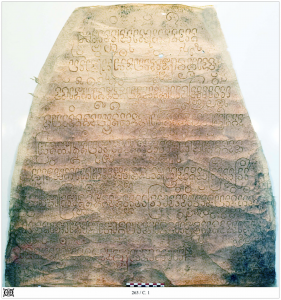
Biên Hòa, Vietnam. Inscription on the reverse of the statue of Viṣṇu in the Bửu Sơn Pagoda (après © EFEO).
(1) |((quatrefoil))| svasti | pu pom̃ ku nan· sūnnu
(2) yām̃ pom̃ ku śrī jaya siṅhavarmmadeva
(3) urām̃ ṅauk· glauṅ· vijaya paripāla rāṣtra sim̃ tmum̃
(4) jaya di nagara yvan· ma°udyāṇna gulāc· tok· nagara
(5) braḥ kānda nī yuddha aneka sim̃ tmum̃ gulāc· jem̃ nagara ca-
(6) mpa di śaka loka aṣṭārdhanalaḥ ṇrapaḥ sakram̃tta tri-
(7) bhavanākrānta nī ṅan· ri jitta sa trā si sim̃ tmum̃ jaya di kvīra
(8) tmum̃ vuḥ bhogopabhoga yathādeva liṅga vukam̃n· rim̃ sim̃ jmai tmum̃
(9) jem̃ nagara kvīra jem̃ nagara campa sadākāla |
Notes: 3 urām̃ ◇ uraṅ Cabaton. — rāṣtra ◇ rāṣṭra Cabaton. — 6 aṣṭārdhanalaḥ ◇ ṣaṣṭārthānalaḥ Cabaton; aṣṭārdhānalaḥ Aymonier; aṣṭārdhanalaḥ Finot. The reading of Aymonier was included in an authorial addition to Cabaton 1904: 690, while Finot took the editorial liberty of inserting his own reading in n. 5 on that same page. Although we do not see a long ā-vocalization on the dg, we agree with Finot and Aymonier that it is necessary to understand aṣṭārdha-analaḥ. — ṇrapaḥ ◇ Finot; ṇdapaḥ Cabaton. The same spelling is found in C. 43, face B, l. 4 and 7. Finot’s reading is publised in n. 5 to . — sakram̃tta ◇ pakram̃ttha (?) Cabaton. Cf. C. 43, face A, l. 9 and c, l. 15 and 21; C. 118. — 6-7 tribhavanākrānta ◇ correct tribhuvanākrānta. The same correction is implicit from Cabaton’s translation. — 7 ra jitta ◇ vijitta Cabaton. — kvīra ◇ kvīr Cabaton. — 8 vukam̃n· ◇ vukān Cabaton. — 9 kvīra ◇ kvīr Cabaton.
Hail! The P.P.K., son of Y.P.K. Śrī Jaya Siṁhavarmadeva, man of Ṅauk Glauṅ Vijaya, was the protector of the realm. He had obtained victory in the land of the Viet, went out [and] returned to take this land of Braḥ Kānda [through] many battles. He has succeeded to create again (? tmuv gulāc jeṅ) a Campa land in Śaka (3) worlds, half-of-eight (4), (3) fires, (1) king (i.e. in 1343 Śaka). He caused this Tribhuvanākrānta (i.e. Viṣṇu) to be made. And he … he obtained victory in Cambodia and succeeded to give property and means of existence per deity for various liṅgas. Also: let the Khmer land never succeed in ruling it, but [let] the Campa land [rule it] forever.